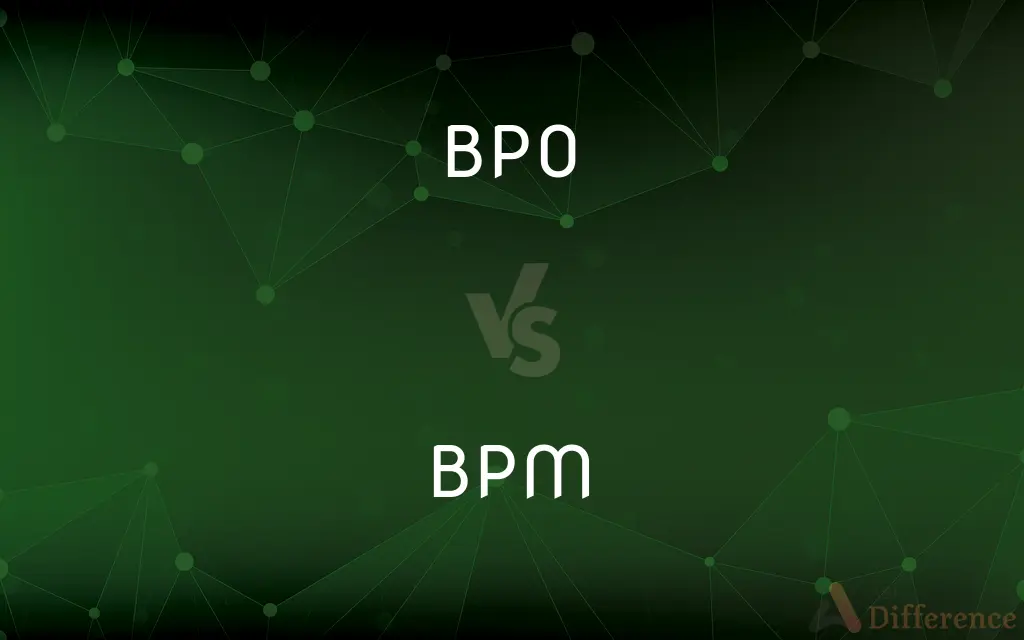BPO vs. BPM — What's the Difference?
Edited by Tayyaba Rehman — By Fiza Rafique — Published on November 20, 2023
BPO (Business Process Outsourcing) involves contracting specific business tasks to third-party providers. BPM (Business Process Management) focuses on improving and optimizing an organization's processes.

Difference Between BPO and BPM
Table of Contents
ADVERTISEMENT
Key Differences
BPO (Business Process Outsourcing) refers to the practice of contracting non-core business activities and functions to a third-party provider. This is done to reduce costs, increase efficiency, and allow a company to focus on its core competencies. BPM (Business Process Management), on the other hand, is an approach that concentrates on enhancing a company's business processes to make them more efficient and effective.
While companies use BPO to delegate certain tasks like customer service, data entry, or IT services to specialized vendors, they employ BPM to streamline and manage these processes. The primary goal of BPO is to offload tasks, whereas BPM aims to refine and optimize processes within the organization.
BPO is often associated with cutting costs since outsourcing can be more cost-effective than maintaining an in-house team. On the other hand, BPM might entail initial costs for tools or consulting but will aim to deliver long-term cost savings and operational improvements.
In essence, BPO is a tactical decision made by companies to enhance efficiency by using external resources. In contrast, BPM is a strategic approach to improve, control, and manage various processes within a business, ensuring they align with the organization's goals.
Comparison Chart
Purpose
Outsourcing certain business tasks
Optimizing and managing business processes
ADVERTISEMENT
Focus
Cost-efficiency and delegation
Process improvement and optimization
Approach
Tactical
Strategic
Implementation
Contracts with third-party providers
Use of tools, methodologies, and practices
Outcome
Task completion by external vendors
Enhanced business process efficiency and effectiveness
Compare with Definitions
BPO
Leveraging external expertise for specific business operations.
The e-commerce platform utilized BPO for its logistics and warehousing needs.
BPM
The use of methods and tools to optimize business operations.
The firm adopted BPM software to streamline its supply chain.
BPO
Delegating non-core business activities to third-party vendors.
By using BPO for data entry, the firm could focus on product development.
BPM
Strategic management of processes to align them with business goals.
Through BPM, the sales process was refined to better cater to customer needs.
BPO
A strategy to enhance efficiency by contracting out particular tasks.
Financial services often use BPO for back-office functions.
BPM
Enhancing the efficiency and effectiveness of organizational processes.
BPM practices helped the company reduce wastage and improve productivity.
BPO
The practice of outsourcing specific business tasks to external providers.
The company opted for BPO to handle its customer service operations.
BPM
An approach to improve and manage business processes within an organization.
After implementing BPM, the company saw a significant reduction in processing times.
BPO
Reducing operational costs by outsourcing functions.
The decision to pursue BPO was influenced by the high costs of maintaining an in-house IT team.
BPM
A discipline focused on refining business activities for better outcomes.
The HR department utilized BPM to revamp the employee onboarding process.
BPM
(music) beat per minute
BPM
The pace of music measured by the number of beats occurring in 60 seconds
Common Curiosities
How does BPM benefit a business?
BPM helps businesses streamline and optimize their processes, leading to improved efficiency and alignment with organizational goals.
Can BPO lead to job losses within a company?
Potentially, as tasks are outsourced, certain in-house positions may become redundant.
Are there risks associated with BPO?
Yes, BPO can come with risks such as loss of control over certain tasks and potential quality issues from third-party providers.
Is BPM only about using software?
No, while software is a component, BPM also involves methodologies, practices, and strategic management of processes.
Is BPM a one-time activity?
No, BPM is an ongoing effort to continuously improve and adapt processes as business needs evolve.
Can a company use both BPO and BPM simultaneously?
Yes, a company can outsource certain tasks (BPO) while also optimizing its processes (BPM).
What tools are commonly used in BPM?
BPM tools often include software solutions, flowcharting tools, and process modeling applications.
Are there industries that particularly benefit from BPM?
All industries can benefit, but sectors with complex processes, like manufacturing, finance, and healthcare, often see significant gains from BPM.
Is there a certification for BPM professionals?
Yes, there are several certifications available for BPM professionals to validate their expertise.
What is the primary goal of BPO?
BPO aims to reduce costs and increase efficiency by outsourcing specific business tasks to third-party providers.
How does a company choose which tasks to outsource in BPO?
Companies typically outsource non-core tasks or functions that can be more efficiently handled by specialized vendors.
How does BPO affect a company's bottom line?
BPO can lead to cost savings, improved efficiency, and the ability to leverage external expertise, positively impacting the bottom line.
Can BPO improve a company's competitive edge?
Yes, by outsourcing non-core tasks, a company can focus on its primary competencies and potentially gain a competitive advantage.
Share Your Discovery

Previous Comparison
Metro Train vs. Local Train
Next Comparison
SMS vs. TextAuthor Spotlight
Written by
Fiza RafiqueFiza Rafique is a skilled content writer at AskDifference.com, where she meticulously refines and enhances written pieces. Drawing from her vast editorial expertise, Fiza ensures clarity, accuracy, and precision in every article. Passionate about language, she continually seeks to elevate the quality of content for readers worldwide.
Edited by
Tayyaba RehmanTayyaba Rehman is a distinguished writer, currently serving as a primary contributor to askdifference.com. As a researcher in semantics and etymology, Tayyaba's passion for the complexity of languages and their distinctions has found a perfect home on the platform. Tayyaba delves into the intricacies of language, distinguishing between commonly confused words and phrases, thereby providing clarity for readers worldwide.
















































